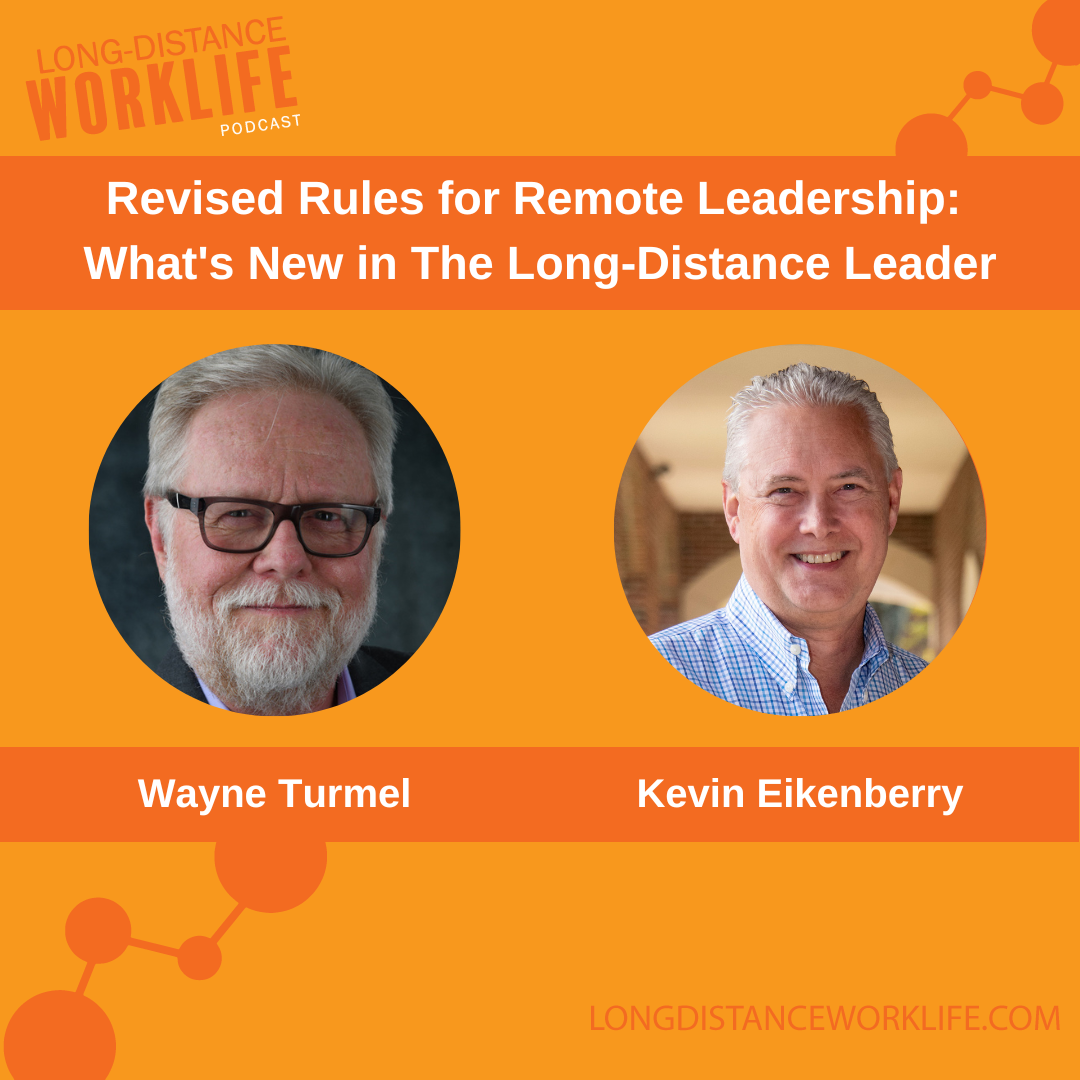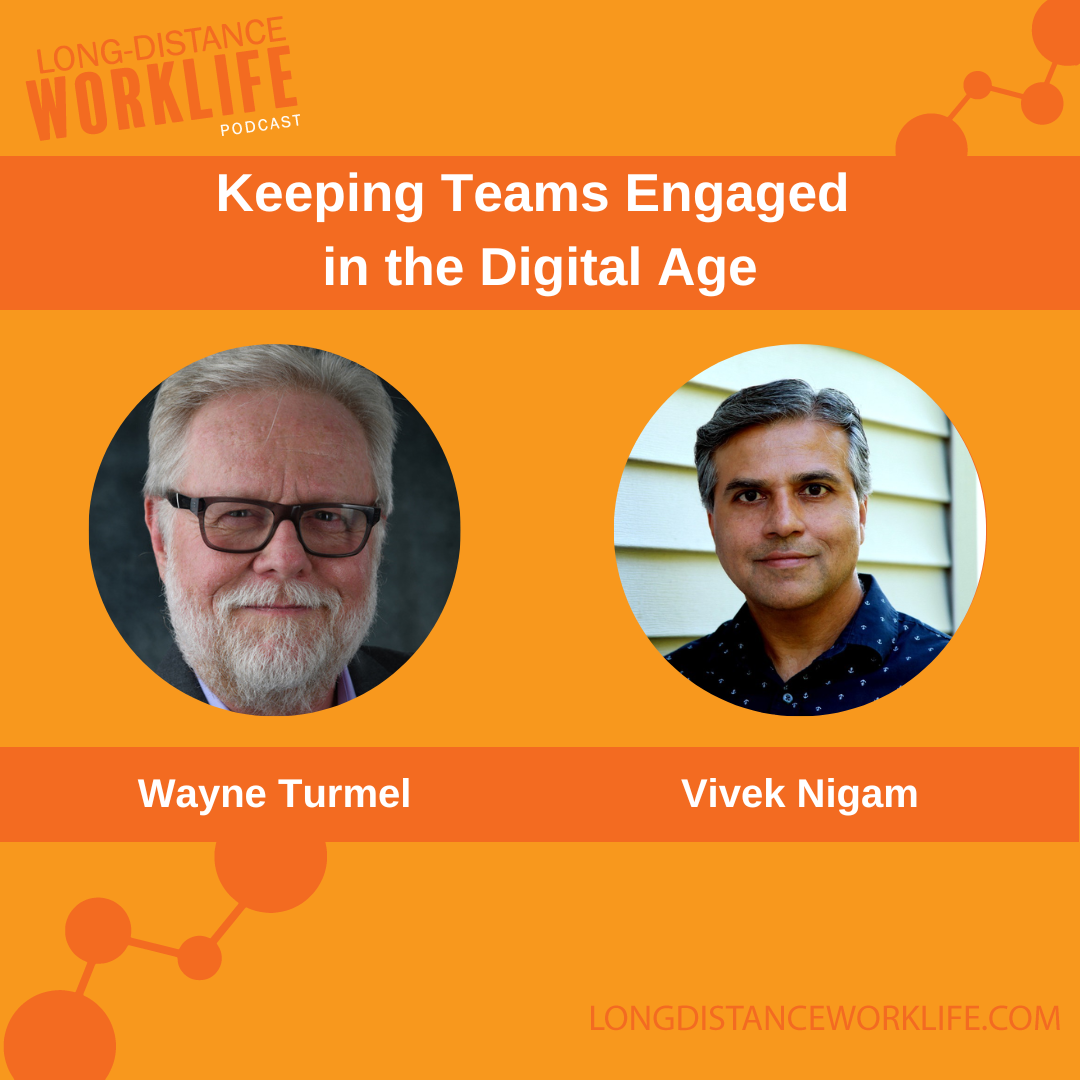In this Q&A episode, Marisa asks Wayne about what companies learned from doing virtual happy hours, courses, and other virtual meetups at the beginning of the pandemic. They discuss what stuck, what was tossed, and things to think about when planning virtual meetups.
Question of the Week:
When we all started working from home, there was a surge of happy hours/virtual classes/etc. to try and help with company culture. What things stuck and what things went away?
Additional Resources
Free Video Series!
Join us for a powerful, 4-part video series titled, Demystifying Remote Leadership. You will learn how to create solid working relationships in a virtual team with more confidence and less stress!
Transcript
Marisa Eikenberry:
Welcome to The Long-Distance Worklife. We're here to talk about technology, remote work, and just all the things that kind of relate around it. I'm Marisa Eikenberry.
Wayne Turmel:
And that would make me Wayne Turmel.
Marisa:
And today we're having another Questions and Answers episode where I'm going to ask Wayne some questions, and one of them is even from the audience and we'd love to get your questions in too, so please let us know on longdistanceworklife.com. We would love to answer your questions. So, Wayne, are you ready to get started?
Wayne:
Probably. I kind of know where we're going. Just full disclosure, I know vaguely what the questions are going to be, but I'm hearing them the same time you are so there.
Marisa:
So I thought where we would start and admittedly we're going to talk a little bit about when pandemic and all that first happened in 2020 but we saw this surge of happy hours, virtual classes. People were doing yoga like all of this kind of stuff to try and help with the company culture. And I know that a lot of that has lessened over time, especially as people have gone back into the office and we're trying to figure out this hybrid thing and flexible work.
But I know that companies learned a lot of valuable tips and tricks during that time. So in your conversations with companies, are there any things that have stuck and what things have gone away?
Wayne:
Yeah, so let's take a look at why all of that stuff happened.
Marisa:
Yes.
Wayne:
Right. I mean, you went from a place where the vast majority of people saw each other at work every day, or at least several days a week.
Marisa:
Right.
Wayne:
And the culture existed and the company was there and all of a sudden mandated and we were told it was going to be for a very short period of time. Remember when this was going to be over by Memorial Day? Yeah. And so a lot of organizations and more importantly, the people in those organizations got thrown into the deep end.
And they had never done this before. And their whole life was different. The rhythm of their life was different. They I mean, the average American gets 60% of their social interaction through the workplace anyway, right? All of a sudden that was shrunk.
Marisa:
Well, and some people that lived by themselves like they were home alone. All the time.
Wayne:
I had a client in Germany who left Frankfurt and moved back with her mother in Bavaria because she had this little studio apartment in in Frankfurt that was great when she had a social life and friends and like that. But when she couldn't go out, those walls closed in really tight.
Marisa:
It was no longer a retreat.
Wayne:
Yeah, there is a human need even for the biggest introverts to have contact with other human beings.
Marisa:
Right.
Wayne:
And what we tried to do and we've talked about this on past episodes we tried as hard as we could to replicate the only thing we knew, which was the office. And so we had the same meetings at the same time that we had in the office.
We tried to bring people together and with the purest of intentions, tried to overcome the distance. We pushed people to use webcams prior to the pandemic. A lot of people wouldn't use webcams for a lot of reasons that we've discussed in the past. All of a sudden it was like, no, we need to do this. We need to maintain our culture on a gut level.
People understood that this was important. What we didn't understand was how much of this can we do and what's the right mix? And how do we do this?
Marisa:
And company cooking classes are probably not a thing that has to happen all the time.
Wayne:
But there was Zoom Church. I mean, the funniest sketch Saturday Night Live has done in a very long time was Zoom Church.
Marisa:
At some point, you and I should have a conversation about online church, but that's a different conversation entirely.
Wayne:
Yes. So we tried to compensate. Right? And we used what was available to us.
Marisa:
Absolutely.
Wayne:
And as always, sometimes it worked and sometimes it didn't. And so that led to, you know, at the office we used to have all this unstructured time or we would go out once a month or we would bring pizza in and everybody would get together.
So let's do that. Only everybody's virtual.
Marisa:
Yeah. Here everybody has an Uber Eats card or whatever.
Wayne:
The logic behind that made perfect sense, right? The reality of it, there's a couple of things. One is it can get a little weird. For example, we had a number of lunches in the office where anybody within kind of spitting distance of Indianapolis came together and we had a camera set up in the conference room and everybody could see everybody and we played kind of icebreaker games.
But here's the thing. It was 9:30 in the morning for me. I was not eating pizza. I was not having lunch. I had already had breakfast. So a lot of that meeting was me watching people eat.
Marisa:
Right.
Wayne:
Right? And it's just the reality of the situation. I understood the importance of the event. I played along but watching other people eat is not the most riveting thing. Also, some organizations did it right. They would provide some organizations provided, as you said, Uber Eats Cards or whatever. Yeah, right. And some organizations did that and some didn't. Again, it depended on the time of day.
Virtual Happy Hour for one group, basically meant day drinking for another which may or may not go bad.
Marisa:
I mean, maybe not all bad.
Wayne:
Which may or may not be the positive thing you're trying to present.
Marisa:
May not be encouraged.
Wayne:
And so it was an attempt to create something that existed before. Now, what we have found out through this is that different organizations, different cultures, cultures, work cultures, different people want and crave different things.
Marisa:
Absolutely.
Wayne:
And everybody needs to make accommodations for everybody else.
Marisa:
Right.
Wayne:
I am not a big fan of forced fun just in general. Right. Other people crave it, need it. We work for an org- I'll tell you how this works and how it doesn't.
Marisa:
OK.
Wayne:
A lot of times we have these monthly meetings. This is my kimono on wide open up. Be grateful you are not watching this on YouTube.
Unless you are and then I'm sorry.
We have monthly meetings and most of these meetings start off with some form of icebreaker.
Marisa:
Yes.
Wayne:
And Kevin, bless his heart wants every member- And we've got about 11, 12 people on any of these calls at a given time. And we all have to, you know... What's your favorite movie? What's your favorite- At Christmas it was what's your favorite Christmas memory. It's lovely and we all know each other.
Marisa:
Right? It's a little easier for us than it might be for some.
Wayne:
Because we already know each other and which means it's both more valuable and less valuable.
Marisa
Yes.
Wayne:
Because we know each other.
Marisa:
Right.
Wayne:
If you don't know each other, I see the value in that conversation.
Marisa:
Yes.
Wayne:
Now, Kevin did one that I loved and here was the deal at the time I thought it was silly and stupid and ridiculous and oh dear Lord, we're really doing this. And he had everybody go around. And what is your favorite candy?
Marisa:
Yes, I remember this.
Wayne:
Right? And everybody went, Now I like this and I like this and I like this obscure chocolate bar. And, you know, for me it was Jujubes or gummy bears. It was gummy bears and like that.
Marisa:
Yeah.
Wayne:
And then a week later, unannounced, no label on the package, nothing. This three pound- picture three pound bag of gummy bears winds up on my front porch.
Marisa:
I remember.
Wayne:
Fortunately, it was not August, 120 degrees.
Marisa:
Yeah. You didn't have one solid gummy bear shaped like a bag.
Wayne:
Exactly. And it actually took me a couple of days to figure out who this came from. And it was fun. It was nice. We I actually reached out to a couple of people. Did you get candy on your door? What was that about? Do we know what this is? And then it became what did you get? And it was fun.
It was and that's an ice breaker that worked great.
Marisa:
I will tell you, as somebody who already knew that those packages were going out, because I'm in the office sometimes anyway, it was fun watching you guys freak out because you didn't know where they came from.
Wayne:
Yeah, it was a lot of it was a lot of fun. And that's an example of an ice breaker that it didn't take a lot of time to do. It was very short and it tied to something else and it had a long term effect.
Marisa:
Yes.
Wayne:
And that's the thing about ice breakers. I have a healthy understanding of why we use them.
Marisa:
Right.
Wayne:
And I have a very little patience for when they drag on and on and on.
Marisa:
I would agree with that, too.
Wayne:
The problem is that the people who organize these things are doing the best they can usually with very little guidance. And usually those types of people fall on the side of erring on the side of fun and connection.
Marisa:
Right.
Wayne:
We had a client. This is absolutely true. I was doing a series of webinars for the client and they sent me this question in advance and said, "This is real. Please do not use anybody's name." This team, this woman led the team she worked from home. She begins every 15 minutes with an update on her cat, Mr. Whiskers, or whatever his name is, is actually the co-host of the meeting and sits on her desk frequently walking in front of the webcam and she encourages everybody to give an update on their pets.
And this gets longer and longer and longer to where the first 10 to 15 minutes of the meeting is. Mr. Whiskers and the Pet Update.
Marisa:
OK. Which I'm sure is awkward for some that don't have pets at all, but that's a different story.
Wayne:
Not only do they not have pets they have lives. They have things they need to do. There is work to be done. Right?
Marisa:
Right.
Wayne:
And the manager because nobody has given them feedback on this. The manager is blissfully unaware that this is a problem.
Marisa:
OK.
Wayne:
Because, in her defense. Nobody said anything so far.
Marisa:
Yeah, OK.
Wayne:
And I enjoy it. So therefore so this is the thing, right? We're trying. And and so you said that at the beginning of the pandemic there was Zoom everything. And in some cases it works. You know that I write novels as well as this. We had a great in-person writers group prior to the pandemic. All of a sudden, a few of us got together and we started working online.
We started doing our critiques online. We had to change the way we do it. We physically had to change the way we did it. But it was a small group of people we were all committed to. And it works great.
Marisa:
Right.
Wayne:
Lots of us have done lots of Zoom things that didn't go so swell. Zoom Yoga. You know, first of all, you couldn't drag my crap to a yoga class anyway, let alone Zoom yoga.
Marisa:
I was going to say, my sister-in-law told me about that one. I think her boyfriend's company was doing it, and I was like, really?
Wayne:
Well, but then there are companies that do yoga classes and companies that don't. So it depends on the culture of the company. Here's the thing is, at some point with any of these connection exercises, there are two things you need to do. Number one is what is the aggregate time that people spend on their webcam on Zoom every single day?
Marisa:
Yeah, you don't want too much Zoom fatigue.
Wayne:
Right? At that point, it just becomes misery.
Marisa:
Right.
Wayne:
The second thing is the golden rule, as we have all been told, is do unto others.
Marisa:
Yes.
Wayne:
The problem with that is we occasionally do unto others in ways they do not want done unto them fair. And this gets to work styles, it gets to preferences. And it's why over time, these things need to be the subject of conversation and coming together and reaching some kind of accommodation with each other. Because one person's bonding time, right?
I'm in this apartment all by myself. And I'm losing my mind and I need to talk to people is somebody else's. Oh, for the love of everything that's holy. Let me get my work done.
Marisa:
Yes, I have also seen some of those too.
Wayne:
And there's an accommodation to be made there, but it doesn't happen unless you talk about it, unless you have some kind of conversation and meeting of the minds where the introverts have to suck it up and, you know, do some playing nicely right others. And the extroverts at some point need to shut up and let people get their work done.
Marisa:
I will say on that line. So it's no secret I'm an introvert haha. I don't like people, et cetera, et cetera. And I'm somebody that's very much heads down, get my work done, whatever. Now, if you want to have a meeting with me, fine, tell me you want a meeting, whatever. And I won't name the coworker. That part's fine.
But I had somebody on our team who had said they had just said, "Hey, I want to have a meeting with you. I want to talk about this tech thing." Well, the tech thing that they had a question on, here's a link from Google. You'll solve it in 3 seconds. It wasn't hard. They didn't really need me on a Zoom call for that.
So to me, I'm looking at it as don't waste my time. And then then they tell me, "Oh, well, I really just wanted a catch up call. I haven't talked to you in a while." Well, just tell me that. And and it was totally fine to then, you know, have that conversation, whatever. But for, for some of you who are more extroverted, you do want to catch up on with these people and stuff.
Tell your introverted team members that that's what you're trying to do. If they have a goal, if they know what the goal is, we tend to be a little bit more willing to play nice.
Wayne:
Well, and a big part of that is just being prepared and knowing what the conversation is.
Marisa:
Absolutely.
Wayne:
If I go into the conversation thinking this is going to be a five minute hashing out of a problem or answering a question, and all of a sudden you're going into, "So how's the dog and what's the weather doing in Vegas?"
Marisa:
It's totally different mindset.
Wayne:
I get a little bit antsy. Whereas if we've blocked 20 minutes and you know, "Hey, I want to catch up, we haven't talked for a while," my brain stops screaming at me and I kind of have allotted that time and I'm good with it.
Marisa:
Absolutely. Absolutely. So just tell your people what the goal of the meeting is.
Wayne:
So here's the thing to wrap up. Yes. What we have been babbling about for 16 minutes. Yes, icebreakers and activities are important. If you are not seeing each other, the group has to have a way to communicate and build relationships and get to know each other and God forbid, have a little fun.
Marisa:
Watercooler channels on Slack are great and we highly recommend them.
Wayne:
And yeah, watercooler channels, by the way. But they also need some guidance and there can be sub-channels. Our team does a great job with the watercooler chat. They come across a funny article, we put gifs or gifs or whatever, little video clips.
Marisa:
There you go.
Wayne:
Says the old man and we bust each other's chops and we have a lot of fun. You can do that in multiple ways. There's, you know, there's family news. There's cool articles that we found there. You know, different companies break it up different ways. Trivia, ongoing trivia things and that's the thing about these events find events that require participation. Watching people eat is not a particularly participative event, but pub trivia contests.
Marisa:
Yeah, people love trivia.
Wayne:
You know, those types of events and don't just dictate them on the team.
Marisa:
Yes.
Wayne:
Right. So there's two things that I would suggest. One is alternate the responsibility for whose job it is to do that.
Marisa:
Yes.
Wayne:
Right. Each meeting somebody else is responsible for how we open the meeting.
Marisa:
That makes sense.
Wayne
That way you get a mix of these. Really, if you were a tree, what kind of tree would you be?
Marisa:
Oh, God, please don't tell Kevin to use that in the next meeting.
Wayne:
Right. But those types of things that drive me crazy versus legitimate, I have breakers that are fun and quick and high energy. The other thing is talk about it as a team. What do you want? What do you need? What is the accommodation that you can come to that strikes the balance of need for social interaction and fun and function and allowing people to get their work done.
Marisa:
Absolutely. Like more opt in as opposed to requirement?
Wayne:
Yes. An opt in ish?
Marisa:
Yes. Yeah, totally makes sense. I know that we're about out of time today, but Wayne, I just want to say thank you so much for answering my question today. I know that there was a lot of stuff that we could have gone into and we just don't have time for it right now. But that's OK. We'll have more episodes coming up.
So please, like and subscribe. You've listened to podcasts before. You know how this works, right? And review. Tell your friends, share the article. Articles? Share the episodes on your social media platforms. If you would like to get in touch with Wayne or I, you can contact us at Wayne@KevinEikenberry.com or Marisa@KevinEikenberry.com or find us on LinkedIn.
All of our show notes and the transcript will be on longdistanceworklife.com as well as a place for you to ask your questions so we can answer them in future episodes. Thank you so much for joining us this week and we'll see you next time.




